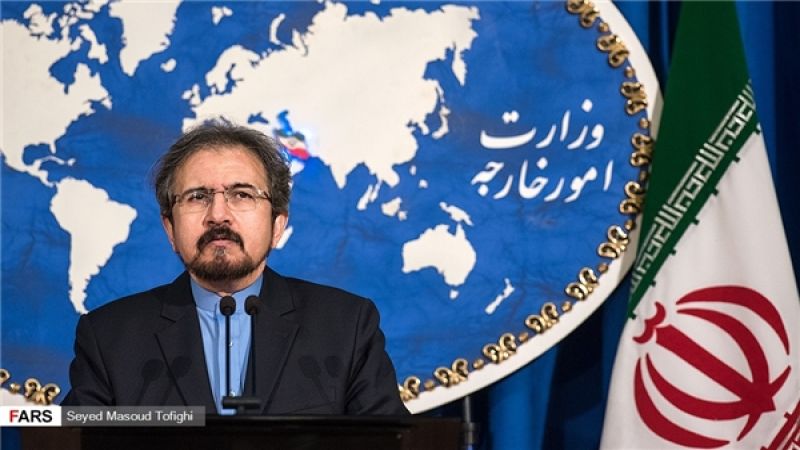
Local Editor
Iranian Foreign Ministry Spokesman Bahram Qassemi blasted Saudi Arabia for its hostile measures against Tehran, and voiced regret that Riyadh is making strategic mistakes in its policies on Iran and Yemen.
"Saudi Arabia is making strategic mistakes both about the region and about Yemen and Iran," Qassemi told reporters in his weekly press conference in Tehran on Monday.
Stressing that Iran doesn’t want tension and is ready for talks despite the Saudi officials' antagonistic remarks, he said, "Talks and understanding doesn’t mean supporting the governments and countries' behavior."
In relevant remarks on Sunday, Qassemi strongly lashed out at the Saudi officials for their allegations against Iran, and urged the Riyadh government to stop its false accusations targeting Iran.
"Saudi Arabia must stop pursuing anti-Iran policies and leveling accusations against the Islamic Republic," Qassemi said.
The Iranian foreign ministry spokesman reiterated that Iran is not in favor of continuing its problems with neighboring states, and said, "Our foreign policy is based on the establishment of constructive relations with other countries, including the Persian Gulf littoral states."
Saudi Arabia launched brutal aggression against its Southern neighbor on 27 March 2015 in a bid to restore power to Yemen's resigned president who fled to Riyadh after Yemeni people's uprising in 2015.
Western countries especially the US, Britain are among key suppliers of weapons used by the Saudi regime to commit atrocities and war crimes in Yemen.
Over 14,100 Yemenis, mostly civilians including women and children have been killed during the ongoing Saudi-leg aggression on Yemen.
The Saudi military aggression has also taken a heavy toll on Yemen’s facilities and infrastructure, destroying many hospitals, schools, mosques and factories. This illegal aggression has prompted retaliation from Yemeni forces including launching missile attacks on Saudi military installations in the country’s capital Riyadh.
Source: News Agencies, Edited by Website TeamSpokesman: S. Arabia Making Strategic Mistakes about Iran, Yemen
Local Editor
Iranian Foreign Ministry Spokesman Bahram Qassemi blasted Saudi Arabia for its hostile measures against Tehran, and voiced regret that Riyadh is making strategic mistakes in its policies on Iran and Yemen.
"Saudi Arabia is making strategic mistakes both about the region and about Yemen and Iran," Qassemi told reporters in his weekly press conference in Tehran on Monday.
Stressing that Iran doesn’t want tension and is ready for talks despite the Saudi officials' antagonistic remarks, he said, "Talks and understanding doesn’t mean supporting the governments and countries' behavior."
In relevant remarks on Sunday, Qassemi strongly lashed out at the Saudi officials for their allegations against Iran, and urged the Riyadh government to stop its false accusations targeting Iran.
"Saudi Arabia must stop pursuing anti-Iran policies and leveling accusations against the Islamic Republic," Qassemi said.
The Iranian foreign ministry spokesman reiterated that Iran is not in favor of continuing its problems with neighboring states, and said, "Our foreign policy is based on the establishment of constructive relations with other countries, including the Persian Gulf littoral states."
Saudi Arabia launched brutal aggression against its Southern neighbor on 27 March 2015 in a bid to restore power to Yemen's resigned president who fled to Riyadh after Yemeni people's uprising in 2015.
Western countries especially the US, Britain are among key suppliers of weapons used by the Saudi regime to commit atrocities and war crimes in Yemen.
Over 14,100 Yemenis, mostly civilians including women and children have been killed during the ongoing Saudi-leg aggression on Yemen.
The Saudi military aggression has also taken a heavy toll on Yemen’s facilities and infrastructure, destroying many hospitals, schools, mosques and factories. This illegal aggression has prompted retaliation from Yemeni forces including launching missile attacks on Saudi military installations in the country’s capital Riyadh.
Source: News Agencies, Edited by Website Team